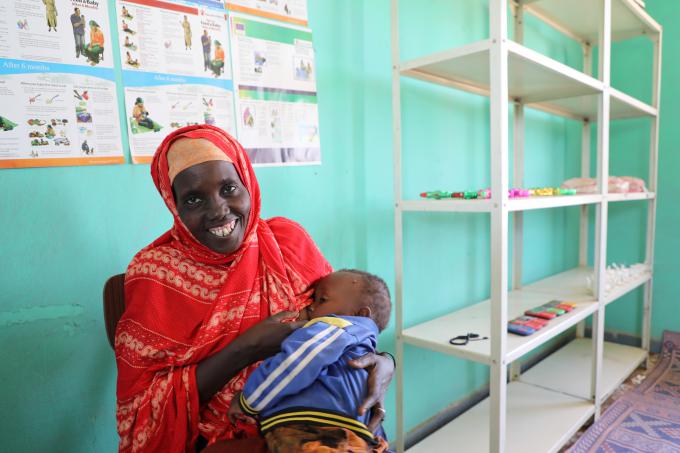From losing six children to leading a healthier family life: Meriem’s Story
Meriem Ibrahim*, 38 and a resident in Hiloba’ad, a small village in Kelafo Woreda of the Somali region in Ethiopia, considers her second marriage as vindication for her horrifying experiences from the first. “I lost all my six children from my first marriage, all at infancy,” Meriem shared her agonizing past. “One stayed alive for four months, and that was the longest. Some of them didn’t make it for longer than four days. I didn’t know why they were all gone that soon.” As though she was to blame, her husband who was “very young” was so discontented with Meriem all those years. “He always beat, insulted and disrespected me. Finally, we got divorced,” she recounted.
Married again for seven years, Meriem is now “blessed with four children” and she said she is “very happy with this one,” referring to her husband who she describes as “a loving and caring old man.” Her darker past sometimes haunts her though, especially when she recalls that she never sought health services when she gave birth to her late children. Neither did she take them to the health post some two hours walk from the village she lived in with her first husband. “If I had known what I know now, I might have saved some of my children,” she always thought.
Meriem has been particularly interested in modern health and nutrition practices ever since she was pregnant with her youngest son, 11-month-old Abdimahad. Save the Children’s Mobile Health Nutrition Teams (MHNTs) came to her village and provided antenatal care, child and maternal vaccination services, and they engaged community volunteers in hygiene and sanitation promotion activities. They also established grass roots Mother- to- Mother- Support -Groups (M2MSGs) like the one Meriem has been a member of.
“Abdimahad is the luckiest of his siblings because I knew better about pregnancy and child birth when I was pregnant with him,” Meriem said. She received antenatal care services at the local health post, and when she gave birth, she said “I gave my colostrum to him within an hour of his birth, and that was something I never did for my other children. I thought colostrum was just a yellow dirt to throw away.”
Abdimahad has also been breast fed like none of her other children. “With my other children, I started breast feeding three nights after they were born.” Tradition dictates that “an infant should be given only water the first three days of its life,” and Meriem obeyed it. Thanks to the counseling she received from Hodan Ibrahim, Save the Children’s IYCF Officer, and support from its MHNTs, Meriem started proper breastfeeding practices with Abdimahad to whom she said she “gave only breast milk until he turned six months.” After he was six months old, she said, “I started to give him softer food like porridge and tried to vary his diet as much as I can.” Varying her children’s diet is, however not very easy. Mariam adds, “we have not been able to use our farmland for years because of the drought in our area.” The little income from her husband’s tailoring work is declining because the locals do not afford to pay, and her husband is getting too old to sew clothes as easily as before. Still, Meriem sees the importance of complementary feeding and tries to be creative to feed Abdimahad well within her own means. “I bought some hens and I use their eggs in my son’s food. I sell some of the eggs to buy vegetables and fruits,” Meriem told me. All this good change in her as a mother, Meriem attributes it to the health and nutrition counseling support she has been able to receive through Save the Children’s IYCF sessions as well as MHNT interventions in her locality. “They are the reason for me to know better on how to raise children and I am always grateful to them,” she acknowledged. Meriem wishes she could send her children to school “so they can become teachers and serve their community.”
Save the Children’s Early Interventions to Save Lives through Integrated Nutrition and WASH Response is a project funded by the Office of U.S. Foreign Disaster Assistance (OFDA) and implemented in 11 Priority One Hotspot Woredas of Ethiopia’s Afar and Somali regions, targeting some 146,010 people. It aims to prevent and treat Severe Acute Malnutrition (SAM) and Moderate Acute Malnutrition (MAM) in children under five and pregnant and lactating women, improve practices of Infant and Young Child Feeding in Emergencies (IYCF-E), and support sustained behaviour change. It also ensures water quality and quantity for target communities to meet international standards through delivery of safe water, installation of water storage and handwashing facilities at health centres, and rehabilitation of water schemes.
*Name changed for protection purposes
 Ethiopia
Ethiopia 